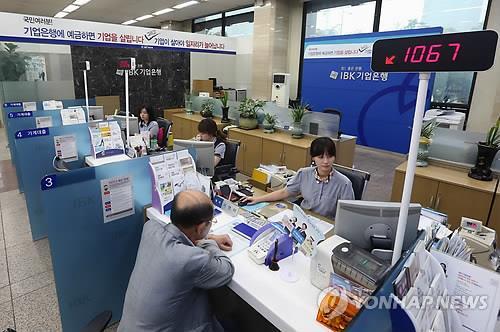South Korean banks' non-performing loans have soared to a 15-year high amid an extensive revamp of troubled shipbuilding and shipping companies, government data showed Thursday.
As of end-March, the total amount of bad loans held by local banks reached 31.3 trillion won ($26.3 billion), up 1.3 trillion won from the end of last year, according to data from the Financial Supervisory Service.

The figure was also up 6.6 trillion won from a year earlier and marks the highest level since 38.1 trillion won in March 2001.
The ratio of bad loans to total lending came to 1.87 percent at the end of March, the highest since March 2010, when the figure reached 2 percent in the wake of the global financial crisis.
Local banks' bad loan ratio was higher than that for lenders in advanced economies. Comparable figures were 1.54 percent for U.S. banks as of end-2015 and 1.53 percent for Japanese lenders as of September last year.
The increase in toxic loans was attributed mainly to a large amount of corporate loans going sour, especially those extended to large companies.
The amount of non-performing corporate loans stood at 29.2 trillion won as of end-March, accounting for a whopping 93.3 percent of the total bad loans.
The bad loan ratio for companies rose to 2.67 percent from 2.56 percent at the end of last year, with the figure for big businesses gaining 0.31 percentage point to 4.07 percent.
Nearly 12 percent of bank loans to shipyards went sour, and the bad loan ratio came to 11.4 percent for shipping companies.
The state-run Korea Development Bank, which is heavily exposed to embattled shipbuilders and shippers, had the highest bad loan ratio of 6.7 percent as of end-March, followed by the Export-Import Bank of Korea with 3.35 percent and Nonghyup Bank with 2.15 percent. The figure for major commercial banks stood in the 1-percent range.
Market watchers said commercial banks will likely see their profitability worsen sharply once current corporate restructuring goes into full swing. The lenders are known to have not set aside loan-loss provisions for lending to shipyards.
"We will keep close tabs on bad loans extended to shipbuilding and other vulnerable industries," said Lee Jae-yong, a senior FSS official. "Banks will be encouraged to amass an optimal level of provisions against loan losses."
The FSS data also showed banks' bad household loans amounted to 2 trillion won as of end-March this year, up 100 billion won from three months earlier. The ratio for soured household loans came to 0.36 percent, up 0.01 percentage point. (Yonhap)







